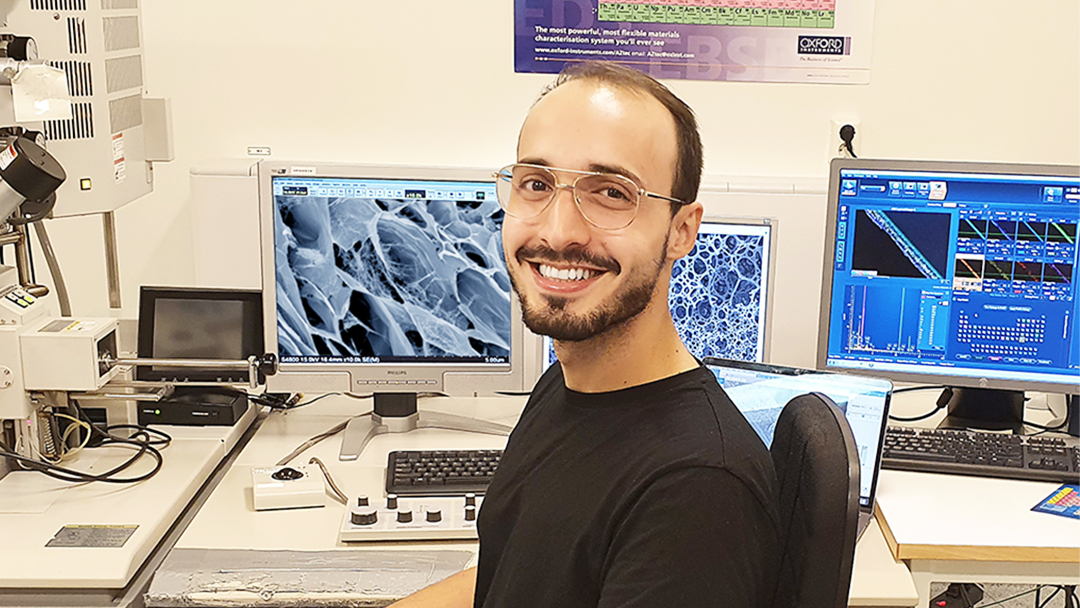Double degree for CBH doctoral student

On October 16, Antonio Capezza, at the Department of Fiber and Polymer Technology (FPT), will defend his dissertation on sustainable superabsorbents. His time as a doctoral student has been a bit special and Antonio is taking a double degree - from both KTH and the Swedish University of Agricultural Sciences.
“My Ph.D. project aimed to the development of sustainable alternatives to petroleum-based highly absorbent materials, also known as superabsorbents. The entire project was framed within the use of renewable resources coming as co-stream and side-streams from the Swedish agricultural industry. In my case, the mentioned co/side-streams are protein concentrates that are obtained from different industrial processes, such as starch extraction from cereals”, says Antonio Capezza.
According to him, the main problem with synthetic superabsorbents is their end-use, both related to current applications and potential future uses. The superabsorbents are used in most daily-care applications, especially those involving disposable items e.g. diapers, bed pads, medical applications. Future uses are envisioned as e.g. agriculture and horticulture to retain water in the soil and overcome the drought as a consequence of the climate change. Thus, the market for this material is increasing, but there is a lack of sustainable alternatives.
“If we don’t start thinking on a solution now, we will be far behind in this delicate area compared to other areas involving the use of petroleum-based plastics.”
How did the collaboration between KTH and SLU come about?
“My two main supervisors, Prof. Eva Johansson (SLU) and Prof. Mikael Hedenqvist (KTH), have been collaborating for almost 15 years, sharing dozens of students and combining the best expertise from both research groups. However, sometimes there are limitations at both institutions that makes the collaboration more difficult. For instance, the use of instruments, access to the courses, access to the facilities of each campus, to mention few. Consequently, at the beginning of this project, they decided to materialize a more connected collaboration, a double degree,” says Antonio Capezza, and continues:
“Moreover, this double degree arrangement actually gave me the chance to get involved personally and professionally in both groups, being able to learn from two different perspectives and get to know double the amount of great scientist and friends!”
"Rather new for all of us"
Everything was not easy though. The double degree solution involved a lot of bureaucracy, traveling (the two campuses being 800 km apart), and all the experiments had to be carefully planned so that Antonio could perform some parts at SLU and some at KTH. He also had to move in the middle of his doctoral studies hence, according to the agreement, the student had to spend one year at each campus.
“Naturally, there was a lot of confusion at the beginning and at the end of the project, emails back and forth, etc. but nothing severe. This is of course understandable, this was rather new for almost all of us. I would say that many of us, at all the institutional levels, have learned from this experience, and are much more prepared for the next experiences yet to come!”
After his dissertation, Antonio Capezza will stay at KTH as a post doc, developing sustainable alternatives to the hygiene and daily-care industry using proteins and cellulose. And his time doing a double doctoral degree has not dissuaded him from doing more collaborative projects.
“I think collaboration is the future in science. How many great discoveries have been done in the past 10 years that do not involve more than one group, one university, one research institution, etc.? My opinion is that individual science and individual thinking are out of fashion. There is no one who is indispensable for anything, instead we are all pieces of a puzzle and it is our task to join us together for completing the big picture! I am a believer that there is no sense in growing alone, is much more grateful to grow together with your peers and your group. I don’t know if I will continue in academia in the future, but if I do, these will be my core values.”
Text: Jon Lindhe
Read more about Antonio's dissertation: Sustainable Biobased Protein Superabsorbents from Agricultural Co-Products

